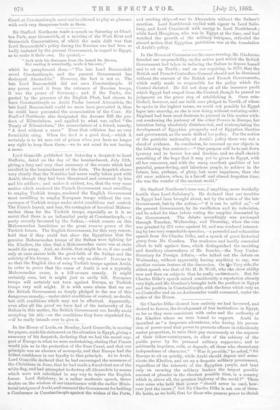Lord Granville published last Saturday a despatch to Lord Dufferin,
dated on the day of the bombardment, July 11th, giving a long and very clear summary of the events which had resulted in the bombardment of the forts. The despatch shows very clearly that the Notables had never really taken part with Arabi, though they had been threatened and overawed by him and his soldiers ; and makes it evident, too, that the very same motive which rendered the French Government most unwilling to employ Turkish troops, rendered the English Government most unwilling to employ European troops without the con- currence of Turkish troops under strict conditions and control, The French feared, and fear, the contagion of fanatical Mahom- medan ideas for the Turkish troops, especially as it is no secret that there is an influential party at Constantinople,—a party secretly favoured by the Sultan,—which counts on this Mahommedan fanaticism as the great reserve power of the Turkish future. The English Government, for this very reason, held that if they could but show the Egyptians that the genuine Mahommedan troops of the Sultan were fighting for the Khedive, the idea that a Mahommedan cause was at stake would die away. And, no doubt, that might be so, if one could only at once ensure both the good-faith of the Sultan and the sobriety of his troops. But can we rely on either ? It seems to us that the English idea of using Turkish troops against Arabi, in order to prove that the cause of Arabi is not a typically Mahommedan cause, is a kill-or-cure remedy. It might certainly cure, but it might just as easily kill. European troops will certainly not turn against Europe, as Turkish troops very well might. It is with some alarm that we see the British Government so deeply pledged to the use of this dangerous remedy,—under strict conditions of control, no doubt, but still conditions which may not be effectual. Apparently, even after all the proof we have had of the insincerity of the Sultan in this matter, the British Government can hardly avoid accepting his aid,—on the, conditions they have stipulated for, —if he really intends ever to give it. •


































 Previous page
Previous page